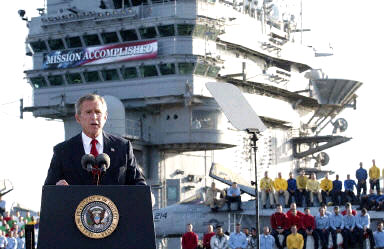 With the commander in chief trying to change the subject from why his war has been such an unmitigated disaster to why we should be scared spitless about the terrorists under our beds, it is worth remembering that it took a lot of hard work by his administration to get the U.S. to the point where it is well nigh impossible to imagine a satisfactory outcome in Iraq.
With the commander in chief trying to change the subject from why his war has been such an unmitigated disaster to why we should be scared spitless about the terrorists under our beds, it is worth remembering that it took a lot of hard work by his administration to get the U.S. to the point where it is well nigh impossible to imagine a satisfactory outcome in Iraq.I have just finished my umpteenth book on the war and best yet. That is "Cobra II: The Inside Story of the Invasion and Occupation of Iraq" by Michael R. Gordon and General Bernard E. Trainor.
Gordon, a military affairs writer for The New York Times and Trainor, a retired Marine Corps general and NBC News military analyst, based "Cobra II" on their unparalleled access to still-secret documents and interviews with top field commanders.
In summarizing the war, they state that the Bush administration committed these "grievous" errors:
* They underestimated their opponent and failed to understand the welter of ethnic troops and tribes that is Iraq.Gordon and Trainor conclude that:
* They did not bring the right tools to the fight and put too much confidence in technology.
* They failed to adapt to developments on the ground and remained wedded to their prewar analysis even after Iraqis showed their penchant for guerrilla tactics in the first days of the war.
* They presided over a system in which differing military and political perspectives were discouraged.
* They turned their back on the nation-building lessons from the Balkans and other crisis zones and fashioned a plan that unrealistically sought to shift much of the burden onto a defeated and ethnically diverse population and allied nations that were enormously ambivalent about the invasion.
* Instead of making plans to fight a counterinsurgency, they drew up plans to bring the troops home and all but declared victory.
There is a direct link between the way the Iraq War was planned and the bitter insurgency the American-led coalition subsequently confronted. The ambitious plans that the president announced to transform American defense proved to be at odds with his bold plan to transform a region.
'OUR CURRENT LEADERSHIP HAS FAILED US'
Kevin Drum at Washington Monthly puts up a link to a story by McClatchy Washington Bureau scribe Joseph Galloway, who asked more than a dozen top Army and Marine Corps generals -- active and retired -- to address what the heck the U.S. should now do in Iraq:All of them agreed that America's strategy and tactics in Iraq have failed . . .
[Marine Lieutenant General Paul] Van Riper said the United States lacks a global strategy for fighting a global war against a global Islamist insurgency. He contrasted what we've witnessed from today's war president with the way America and its leaders prepared and planned the campaigns in World War II, and how President Franklin D. Roosevelt explained the strategy and the campaigns to educate the public and ensure support for the war.
"Our current leadership has failed us in these most basic of obligations," he said.
No comments:
Post a Comment